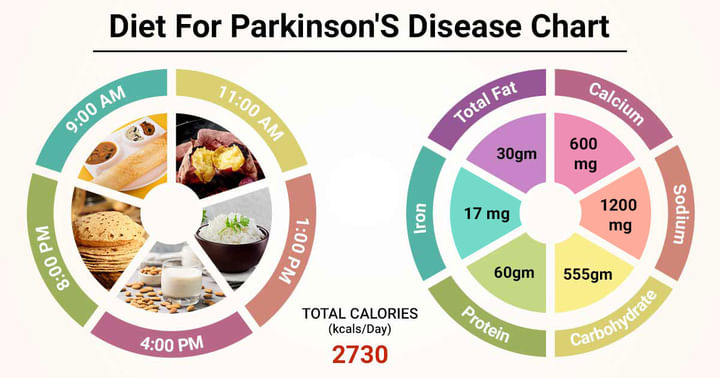Get the App
For Doctors
Login/Sign-up
About
Health Feed
Find Doctors
Diet Chart For parkinson's disease
Last Updated: Jan 20, 2025
About
Parkinson disease is a disorder of central nervous system which affects the motor system. It occurs due to the loss of ’dopamine’ producing brain cells. Dopamine is a chemical that acts as a neurotransmitter for sending signals to other nerve cells. Symptoms of this disease include tremors or trembling, slow movement, body rigidity, and stiffness, the problem in walking. Symptoms usually occur after the 60 years of age.
A healthy and balanced diet for Parkinson disease can improve the well being of the person suffering from it. Consuming antioxidant-rich diet will reduce ‘oxidative stress’ which promote the symptoms of this disease. Antioxidant-rich vegetables are kale, okra, bell pepper, tomatoes, and spinach. Fruits like Blueberries, cranberries, apples, grapes, pears, and blackberries are a great source of antioxidants. Nuts like hazelnuts, pecans, and pistachios can be added to this list. Also, increase in fluids and fibre consumption can be beneficial. Drink six to eight glasses of water every day.
Increase the intake of omega 3 fatty acids because they have anti-inflammatory property beneficial for this disease. Sources of omega 3 fatty acids are salmon fish, flaxseed, walnuts, and soybeans. Fava beans should be in the diet for Parkinson disease because it levodopa, a key ingredient for the drugs used in the treatment of this disease. Food items that should be avoided in the diet are air-dried meat, soy sauce, red wine and tap beer.
Diet Chart
| Sunday | |
| Breakfast (8:00-8:30AM) | Ragi dosa-3+2 tsp methi chutney+1 glass milk(toned) |
| Mid-Meal (11:00-11:30AM) | 1/2 cup of roasted sweet potato salad with 1 tsp olive oil |
| Lunch (2:00-2:30PM) | 1 cup parboiled rice+2 roti+1/2 cup pumpkin dal+1/2 cup capsicum sabji+1 glass buttermilk |
| Evening (4:00-4:30PM) | 1 glass almond(4-5 powdered) milk(toned) |
| Dinner (8:00-8:30PM) | 3 roti/ 1 cup parboiled rice+1/2 cup ridge gourd sabji+1 glass buttermilk |
| Monday | |
| Breakfast (8:00-8:30AM) | Dalia upma-1.5 cup with vegetables(potato,onion,tomato,green peas, carrot)+1 glass milk(toned) |
| Mid-Meal (11:00-11:30AM) | 1 apple |
| Lunch (2:00-2:30PM) | 4 roti+100gm fish(tuna/sardine/salmon/mackerel with little olive oil)-grilled/stewed+1/2 cup rajmah curry |
| Evening (4:00-4:30PM) | 1/2 cup of beetroot, carrot and broccoli salad with 1 tsp olive oil+1 cup green tea |
| Dinner (8:00-8:30PM) | 3 multi grain roti (jowar, bajra, wheat)/ 1 cup parboiled rice+1/2 cup ivy gourd sabji+1 glass buttermilk |
| Tuesday | |
| Breakfast (8:00-8:30AM) | Oats-1/2 cup+milk(toned)-150ml |
| Mid-Meal (11:00-11:30AM) | 1 grape fruit |
| Lunch (2:00-2:30PM) | 1 cup parboiled rice+2 jowar roti+1/2 cup tomato dal+1/2 cup cluster beans curry+1 glass buttermilk |
| Evening (4:00-4:30PM) | 1 small fist of peanuts,raisins,almonds,walnuts+1 cup green tea |
| Dinner (8:00-8:30PM) | 3 roti/ 1 cup parboiled rice+1/2 cup bhindi sabji+1 glass buttermilk |
| Wednesday | |
| Breakfast (8:00-8:30AM) | Idly-4+sambhar-1/2 cup+green chutney-2 tsp+1 glass milk(toned)/1 cup tea |
| Mid-Meal (11:00-11:30AM) | 1 cup of pomegranate seeds |
| Lunch (2:00-2:30PM) | 4 bajra roti+1/2 cup lauki dal+1/2 cup green peas and capsicum sabji+1 glass buttermilk |
| Evening (4:00-4:30PM) | 1/2 cup of stewed salmon and lettuce salad+1 cup green tea |
| Dinner (8:00-8:30PM) | 3 multigrain roti (bajra, oats, ragi)/ 1 cup parboiled rice+1/2 cup snake gourd sabji+1 glass buttermilk |
| Thursday | |
| Breakfast (8:00-8:30AM) | Wheat dosa-3+2 tsp pudina chutney+1 glass milk(toned)/1 cup tea |
| Mid-Meal (11:00-11:30AM) | 1/2 cup banana and oats porridge |
| Lunch (2:00-2:30PM) | 1 cup parboiled rice+2 bajra roti+1/2 cup methi dal+1/2 cup french beans sabji+1 glass buttermilk |
| Evening (4:00-4:30PM) | 1 glass walnut milk(toned) |
| Dinner (8:00-8:30PM) | 3 roti/ 1 cup parboiled rice+1/2 cup bittergourd sabji+1 glass buttermilk |
| Friday | |
| Breakfast (8:00-8:30AM) | Roasted oats upma-1.5 cup with vegetables(potato,onion,tomato,green peas, carrot)+1 glass milk(toned)/1 cup tea |
| Mid-Meal (11:00-11:30AM) | 100gm musk melon |
| Lunch (2:00-2:30PM) | 1 cup parboiled rice +2 roti+100gm fish(tuna/sardine/salmon/mackerel) curry+1/2 cup soya chunk and aloo sabji |
| Evening (4:00-4:30PM) | 1 glass avocado(75gm) milkshake(milk-150ml-toned) |
| Dinner (8:00-8:30PM) | 3 multi grain roti (corn flour, wheat, oats)/ 1 cup parboiled rice+1/2 cup lauki sabji+1 glass buttermilk |
| Saturday | |
| Breakfast (8:00-8:30AM) | carrot paratha-2+2 tsp green chutney+1 glass milk(toned)/1 cup tea |
| Mid-Meal (11:00-11:30AM) | 6-7 strawberries |
| Lunch (2:00-2:30PM) | 4 roti+1/2 cup palak dal+1/2 cup bitter gourd sabji+1 glass buttermilk |
| Evening (4:00-4:30PM) | 1 glass milk(toned)+2-3 ragi biscuits) |
| Dinner (8:00-8:30PM) | 3 roti/ 1 cup parboiled rice+1/2 cup cauliflower sabji+1 glass buttermilk |
Food Items To Limit
- Dairy products : If you’re going to stop consuming dairy products like milk, cheese, and yogurt, you might want to consider a calcium supplement to make up for the loss of calcium in your diet.
- Foods high in saturated fat : Foods that have been fried or heavily processed alter your metabolism, increase blood pressure, and impact your cholesterol.
- Cured, fermented or air-dried meats or fish
- Aged cheeses: aged cheddar or Swiss, blue cheeses, Camembert
- Fermented cabbage: sauerkraut, kimchi
- Soybean products, including soy sauce
- Red wine and tap beer
Do's And Dont's
Do's & Don'ts:
- Use the Food Guide Pyramid to structure your eating habits. Choose a wide variety of foods from all the food groups. At each meal try to consume a portion from at least three of the food groups.
- Limit your total fat, saturated fat, and cholesterol. You can accomplish this by choosing lean meats, cheeses, and dairy products. Trim the visible fat off your meat. Grill, broil, or bake meat rather than frying. Choose 1 percent butterfat or less milk and milk products. Limit total fat to 30 percent of your daily calories.
- Limit your salt or sodium. You can achieve this by choosing more fresh or frozen foods and limiting processed foods. Go easy on condiments such as olives, ketchup, mustard, pickles, and soy sauce. Read food labels and choose foods that have a sodium content of 5 percent or less of the daily value per serving. Eat plenty of fruits and vegetables, which are naturally low in salt. Please note that if you have hypotension, you may be asked to increase your salt intake under a doctor’s supervision.
- If you drink alcohol, do so only in moderation. Alcohol supplies moderate amounts of calories and few nutrients. Limit intake to one drink per day for women or two drinks per day for men.
- Choose a diet high in fiber. A high-fiber diet may protect against many chronic diseases. You can accomplish this by selecting whole grains, minimally processed foods, fruits and vegetables.
Food Items You Can Easily Consume
- Antioxidants : blueberries, blackberries, goji berries, cranberries, tomatoes, peppers, eggplant, and other nightshade vegetables.
- Fava Beans : Some people eat fava beans for Parkinson’s because they contain levodopa — the same ingredient in some drugs used to treat Parkinson’s.
- Omega-3s : Soy in particular is being studied for its ability to protect against Parkinson’s. These foods contain omega-3 fatty acids, which might improve cognitive function.
- Stay Hydrated : Staying hydrated is important for everyone, especially people with Parkinson’s. Aim to drink six to eight glasses of water each day to feel your best.
- VItamin D : Vitamin D has been demonstrated to protect against Parkinson’s, so getting fresh air and sunshine might help your symptoms.
- Different kinds of exercise and physical therapy can improve your abilities and slow the progression of Parkinson’s.
References
- VanItallie TB, Nonas C, Di Rocco A, Boyar K, Hyams K, Heymsfield SB. Treatment of Parkinson disease with diet-induced hyperketonemia: a feasibility study. Neurology. 2005 Feb 22;64(4):728-30. [Cited 01 July 2019]. Available from:
- Hellenbrand W, Boeing H, Robra BP, Seidler A, Vieregge P, Nischan P, Joerg J, Oertel WH, Schneider E, Ulm G. Diet and Parkinson's disease II: A possible role for the past intake of specific nutrients: Results from a self-administered food-frequency questionnaire in a case-control study. Neurology. 1996 Sep 1;47(3):644-50. [Cited 01 July 2019]. Available from:
- Chen H, Zhang SM, Hernán MA, Willett WC, Ascherio A. Diet and Parkinson's disease: a potential role of dairy products in men. Annals of Neurology: Official Journal of the American Neurological Association and the Child Neurology Society. 2002 Dec;52(6):793-801. [Cited 01 July 2019]. Available from:
Book appointment with:
Delhi
Mumbai
Chennai
Bangalore
Index
Table of content
Content Details
Written ByDrx Hina FirdousPhD (Pharmacology) Pursuing, M.Pharma (Pharmacology), B.Pharma - Certificate in Nutrition and Child CarePharmacology
Reviewed By
Find Dietitian/Nutritionist near me
Ask a free question
Get FREE multiple opinions from Doctors
posted anonymously



